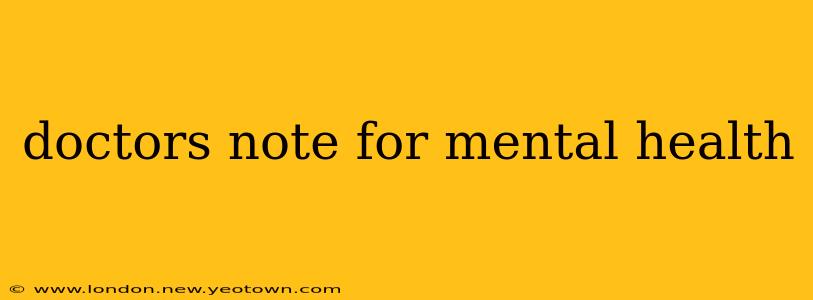Navigating the Landscape of Doctors' Notes for Mental Health
The need for a doctor's note for mental health reasons can arise in various situations, from requesting time off work to seeking accommodations at school or university. However, the process and the specific information included in the note can vary significantly. This journey often begins with a conversation with your mental health professional, a crucial step that deserves careful consideration. Let's explore the intricacies of obtaining and utilizing such documentation.
What information is typically included in a doctor's note for mental health?
This is a common question, and the answer isn't one-size-fits-all. Imagine Sarah, a graphic designer struggling with anxiety. Her doctor's note might simply state that she's under their care for anxiety and needs a short period of leave for treatment. Conversely, Mark, a professor dealing with a more severe depressive episode, might receive a note outlining specific limitations and detailing the need for more extended leave and potential accommodations. The note usually includes:
- Patient's Name and Date of Birth: Essential for identification and privacy.
- Date of Note: Indicates the current status of the patient's condition.
- Diagnosis (sometimes): This is where things get nuanced. Depending on privacy laws and the individual's preferences, a diagnosis might be explicitly mentioned, or the note may simply refer to a need for treatment for a mental health condition without specifying the diagnosis. This is a critical conversation to have with your doctor.
- Recommendations: This is where the doctor outlines any recommended accommodations or limitations. This could range from a need for reduced workload to a complete absence from work or school.
What are the legal and ethical considerations surrounding these notes?
Privacy is paramount. HIPAA (Health Insurance Portability and Accountability Act) in the US, and similar legislation in other countries, governs the release of medical information. Your doctor must obtain your explicit consent before releasing any details of your mental health. They'll carefully consider what information is necessary and appropriate to disclose to protect your privacy while still addressing your needs.
How do I request a doctor's note for mental health?
The first and most important step is to be open and honest with your mental health professional about your situation and your need for a doctor's note. Explain why you need the note and where you'll be using it. This will help your doctor tailor the note to your specific requirements.
What if my employer or institution requests specific details?
This is a situation where the importance of careful communication becomes truly evident. While your doctor will do everything possible to accommodate your requests within legal and ethical bounds, they might not be able to provide every detail requested. Open communication between yourself, your doctor, and your employer or institution is vital to finding a solution that respects everyone's needs.
Are there alternatives to a traditional doctor's note?
In some cases, alternative forms of documentation might be more suitable. For instance, a letter from a therapist outlining treatment progress and recommendations could be acceptable. The specific requirements will depend on the employer or institution.
What if I'm uncomfortable providing a doctor's note?
Your feelings are valid. Remember that you have the right to advocate for your privacy. Discuss your concerns openly with your doctor; together, you can find a solution that balances your needs with your privacy concerns. In some cases, a generalized statement about your need for time off due to illness might be a viable alternative, though this approach can vary depending on legal and organizational policies.
The process of obtaining a doctor's note for mental health issues requires careful consideration of privacy, legal requirements, and personal comfort levels. Open communication with your mental health professional is key to navigating this process effectively and respectfully. Remember, your health and well-being are paramount.

